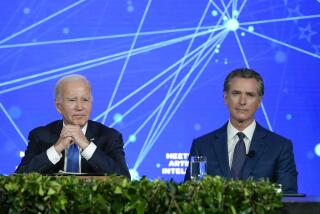Clinton Stresses Urgency of Year 2000 Bug
- Share via
WASHINGTON — It has become a shadow looming over the government, the economy and a multitude of daily tasks that are usually taken for granted: On Jan. 1, 2000, will the nation’s system of interlinked computers go haywire?
On Monday, Wall Street tested a mock-up of a new computer system that eluded disaster. And on Tuesday, President Clinton lent his voice to those who see “a pressing need for action.”
Clinton has been criticized by Republicans for failing to take more of a lead on the computer matter. To answer, he went to the National Academy of Sciences to “stress the urgency of the challenge to people who are not in this room.”
The problem, dubbed the “millennium bug,” arises from the inconvenient fact that computer systems are not set to recognize the year 2000. Instead they will interpret it as 1900, potentially wreaking havoc at the government agencies, corporations, utilities and other entities that depend on them both in the United States and overseas. The solution involves a painstaking process of rewriting computer software, which must be repeated countless places around the world.
Certainly, experts disagree on the need for alarm, with skeptics blaming a cottage industry of doomsayers for seizing on the bug as the latest fashionable anxiety. Just this week, for example, 41 financial firms on Wall Street began a test exercise, replete with mock trades, to prepare for the challenge. The early reports were favorable.
Still, Clinton suggested Tuesday, there is at least the possibility of a chaotic, very expensive mess as the calendar changes from Dec. 31, 1999, to Jan. 1, 2000. Indeed, headaches could begin even sooner--for instance, as people attempt to make airline or hotel reservations for dates after 2000.
The Clinton administration, which expects $5 billion in federal expenditures to combat this first headache of the approaching millennium, Tuesday proposed three measures to reduce the risks and encourage the spread of expertise.
* It will submit to Congress “good Samaritan” legislation designed to shelter from lawsuits companies and people who share information on technical solutions to the glitch.
* It will contribute $12 million to the World Bank to help spread awareness of the dilemma to developing countries. Outside the United States, there is much less focus on the problem.
* The Labor Department announced a new Internet site to help link those who need technical assistance with those ready to provide it, at the department’s home page, https://www.dol.gov.
“The consequences of the millennium bug, if not addressed, could simply be a rash of annoyances like being unable to use a credit card at the supermarket or the video store losing track of the tape you have already returned,” Clinton said in a bid to strike the right balance between careful concern and outright fear. The problem, he continued, could disrupt electric power, telephone service, air travel and major federal agencies.
“With millions of hours needed to rewrite billions of lines of code and hundreds of thousands of interdependent organizations, this is clearly one of the most complex management challenges in history,” he said.
After the president spoke, an official at an association that represents many high-tech firms sounded encouraged, if not overwhelmed, by Clinton’s remarks.
“We think it’s certainly a good step in the right direction,” said Bob Cohen, vice president of the Information Technology Assn. of America in Arlington, Va. “It’s very important to have gotten the prestige of the office of the presidency into the whole year 2000 discussion.”





